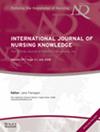Clinical validation of the nursing outcome “Swallowing status: pharyngeal phase” in patients with laryngeal cancer
Abstract
Aims and objectives
This study aimed to clinically validate the nursing outcome “Swallowing status: pharyngeal phase” (1013).
Methods
A two-stage study was designed: (1) Chinese translation and cultural adaptation and (2) clinical validation. Internal consistency and interrater reliability tests were performed on 285 patients with laryngeal cancer, and an additional 130 patients were randomly selected from the 285 patients as an independent sample. Criterion-related validity tests were performed using the standardized swallowing assessment (SSA). Nursing outcome sensitivity was detected by scoring two time points.
Results
The Cronbach's alpha coefficients were 0.951 for the nursing outcome and 0.942–0.965 for each indicator. The interclass correlation coefficient (ICC) values for each indicator ranged from 0.73 to 0.929. The scores of the nursing outcome were negatively correlated with the SSA scores (r = −0.555, p < 0.01). With the exception of two indicators, there was a significant difference (p < 0.05) between the total scores of the scale and its 11 indicator scores for the two time points. The results indicated that the nursing outcome “Swallowing status: pharyngeal phase” (1013) exhibited satisfactory psychometric properties and high sensitivity to change.
Conclusions
The nursing outcome “Swallowing status: pharyngeal phase” (1013) demonstrated good reliability, validity, and sensitivity in patients with laryngeal cancer.
Implications for nursing practice
The nursing outcome “Swallowing status: pharyngeal phase” (1013) can be used to assess swallowing function in patients with laryngeal cancer and provide guidance for the development of rehabilitation intervention plans and nursing care.

 求助内容:
求助内容: 应助结果提醒方式:
应助结果提醒方式:


